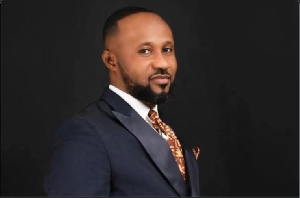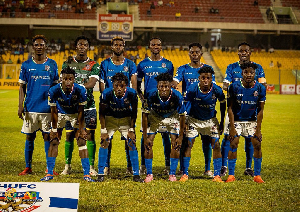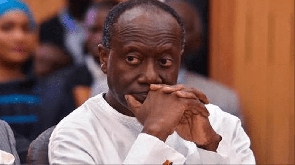Saren Idaho said he has no connection to Sierra Leone and had never been to the country until he was deported there from the US six months ago.
"I know nobody here," lamented the 55-year-old father of two.
Looking unwell and struggling to walk, he sat down on a plastic chair in his sparsely furnished hotel room in the capital, Freetown. As he was talking he played with a pack of cigarettes and several butts were squashed in an ashtray beside him.
At least this was better than the crowded police cell, where he slept on the floor "with cockroaches, rats and bed bugs" for the first five months of his time here.
Prince Latoya, 47, was on the same deportation flight and is in the same situation.
Both men, who had never met before coming to Sierra Leone, were long-term residents of the US. But they say they were originally from the Caribbean, which the US authorities dispute.
Idaho and Latoya were expelled last August, along with 17 Sierra Leoneans, among other West Africans, who had been convicted of committing crimes in the US.
They ended up on that flight after staff at Sierra Leone's embassy in Washington DC were put under pressure by US officials, according to Isha Sillah, director for the Americas and the Pacific at the foreign ministry here.
She said that the US immigration authorities had submitted documents to the embassy that "appeared to suggest" that the two men were from Sierra Leone. Without cross-checking, embassy officials issued them each with an Emergency Travel Certificate (ETC).
Embassy staff had told her that "what contributed to the issuance of the ETC was also pressure piled on them by the State Department and the Department of Homeland Security" to accept them as Sierra Leoneans.
"The Sierra Leone government are like puppets to the Americans," Latoya, who said he was originally from the Bahamas, told the BBC.
Idaho was angry with the US authorities.
"America forged documents to bring me here claiming this to be my country of citizenship," he said. "And I know I was not born in this country.
"I am from the Commonwealth of Dominica. What is so hard about returning to the US?"
'Denied by Dominica' This has now become a massive bureaucratic problem.
The foreign ministry has contacted the two Caribbean countries' embassies in Washington to certify that the two men were born there.
"The Dominican embassy has denied that Idaho is their national while the Bahamian embassy says more documents are needed to enable them make a determination - hence it's inconclusive," Ms Sillah said.
Meanwhile, they are stuck in limbo in the hotel.
The manager, Osman Kamara, said the men were checked in by the police with an advance payment for their lodging, but that ran out and an anonymous businessman stepped in to pay the bills to stop them being thrown out.
He also paid for a food and clothing allowance.
Before that, they were each getting $2.50 (£2) to cover daily costs, which they said barely paid for breakfast and bottled water.
"We have been living here with no food, no medical care, nothing," Latoya said.
Lost ID
The two men had been receiving extra money from relatives sent through Western Union. But as their Sierra Leone travel documents have now expired, they can no longer pick up the cash as a valid photo ID is required.
Idaho said he had been living in the US for 28 years until he was arrested and jailed in 2018 for driving while drunk.
He has lost all his ID documents. They were in a house that was seized by the bank as he was unable to pay the mortgage because he was imprisoned, he said.
"All my possessions, including my birth certificate, are locked in a store somewhere after the takeover of the house," he told the BBC.
His wife of 17 years, Mowanda Idaho, and his two sons, aged 14 and 11, are now living in the US state of South Carolina.
"It has been devastating for me and the two boys with the 14-year-old now living in a state of depression and failing in school," Ms Idaho, who is an American citizen, said by phone.
She last saw him for "a five-minute encounter" when he was taken to prison in April 2018.
She had spoken to an immigration lawyer who told her that he had heard nothing like her husband's case before. But she says she cannot afford the legal fees to take the authorities to court.
Latoya, who had lived in the US for 25 years, was convicted of identity theft. He said he had no wife or children.
'They said they were from Sierra Leone'
But the US government sees things differently.
In an email to the BBC, the Department of Homeland Security (DHS) described Latoya as a "criminal alien who has been convicted of multiple identity theft-related criminal offenses".
It said that he entered the country illegally in 1997, and "on numerous occasions, Latoya stated to US immigration officers that he was a citizen of Sierra Leone".
The Sierra Leonean embassy in Washington confirmed his citizenship, the DHS
Africa News of Sunday, 8 March 2020
Source: bbc.com













